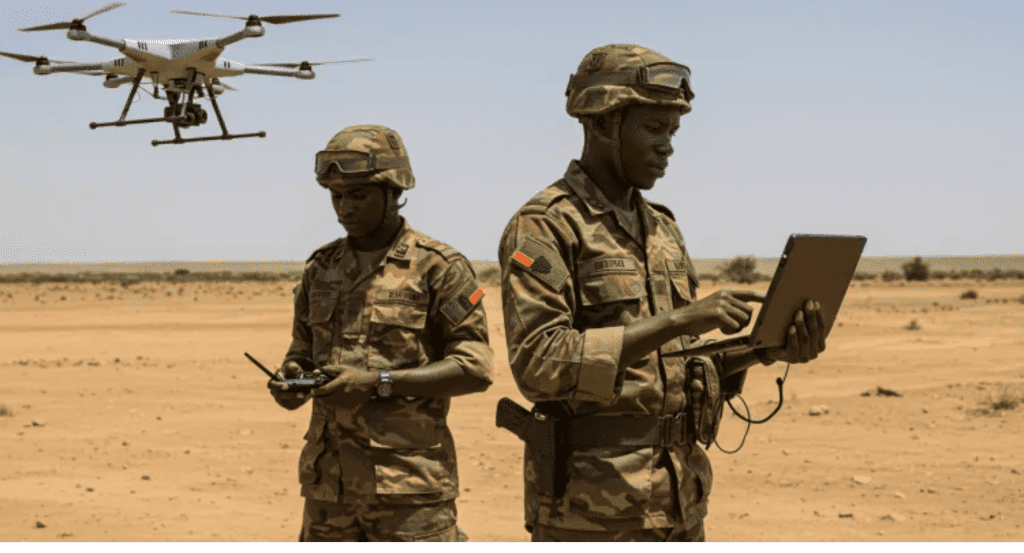The Economic Community of West African States (ECOWAS) is set to integrate Artificial Intelligence (AI) and other emerging technologies into its security framework to strengthen counter-terrorism and peace operations across the region. This initiative aims to tackle the persistent security challenges in West Africa, including insurgency, terrorism, and climate-related threats.
The conversation around ECOWAS AI security gained momentum at a recent validation meeting of government experts in Abuja, where officials deliberated on enhancing logistics for Peace Support Operations (PSO) ahead of the commissioning of the ECOWAS Logistics Depot in Lungi, Sierra Leone later this year.
ECOWAS AI Security: A Game Changer for Regional Stability
At the core of this initiative is a proposal to incorporate AI, drones, and other smart technologies into the operations of the ECOWAS Standby Force. These advancements are expected to boost intelligence gathering, improve response times, and optimize military logistics in tackling security threats.
Air Commodore Sampson Eyekosi, a Nigerian Air Force officer and chairman of the validation meeting, highlighted the importance of adopting AI-driven solutions.
“We want to leverage technology and fight against terrorism, insurgency, and other threats we see, even climate change,” he stated, emphasizing the need for an advanced approach to regional security.
This ECOWAS AI security strategy will be presented to the Heads of State and Government for ratification in March. If approved, it could redefine how peace and security operations are conducted in the region.
Strengthening ECOWAS Standby Force with AI and Localized Logistics
Beyond AI integration, the discussions also focused on reducing reliance on foreign military equipment. ECOWAS aims to source military hardware locally, ensuring that the Standby Force is well-equipped without excessive dependence on external suppliers.
Eyekosi stressed the significance of this self-reliance, stating:
“Peace and security is first our responsibility. We must take ownership. We must take charge.”
Funding remains a crucial factor in the success of this initiative. ECOWAS is exploring diverse financial avenues, including contributions from member states and private sector partnerships, to sustain its security efforts effectively.
SEE ALSO: ECOWAS; AfDB Sign $12M REWARD Project to Strengthen West Africa’s Rice Sector
ECOWAS AI Security Initiative Aligns with Global Military Trends
The Nigerian Navy has already begun incorporating AI and emerging technologies into its operations. Last year, Chief of Naval Staff Vice Adm. Emmanuel Ogalla announced plans to leverage AI for enhanced naval activities, improving efficiency and decision-making at sea.
This move aligns with global trends where military forces increasingly adopt AI to automate intelligence gathering, optimize logistics, and strengthen surveillance capabilities. By adopting AI-driven security measures, ECOWAS could revolutionize regional security operations and ensure a more robust defense system against evolving threats.
The Road Ahead: A Collective Effort for AI-Driven Security
The success of the ECOWAS AI security initiative will depend on collaboration among governments, security agencies, private sector players, and civil society groups. Air Commodore Eyekosi emphasized a “whole-of-society approach”, calling for media engagement and public awareness to strengthen support for these security advancements.
As the ECOWAS Logistics Depot nears completion and AI integration moves closer to implementation, the region stands at a defining moment. If executed effectively, this initiative could usher in a new era of security, resilience, and stability for West Africa.
“We need to work together, and this is what we are doing,” Eyekosi concluded, reinforcing the commitment to a tech-driven security transformation.
With AI, West Africa’s fight against terrorism and insurgency could become smarter, faster, and more effective than ever before.























